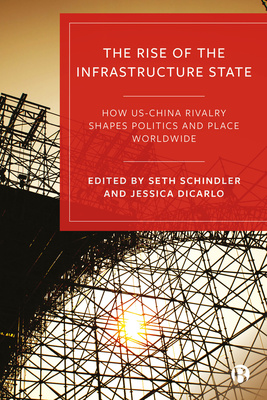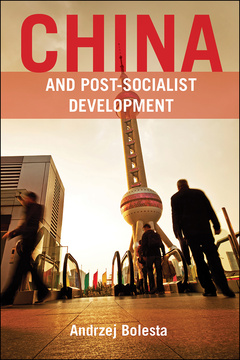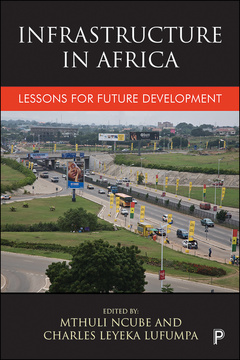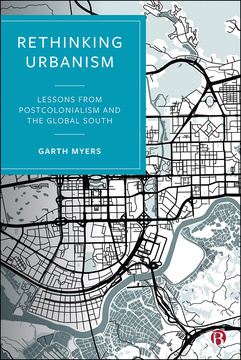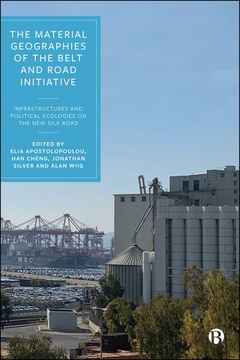The Rise of the Infrastructure State
How US–China Rivalry Shapes Politics and Place Worldwide
Edited by Seth Schindler and Jessica DiCarlo
Published
Dec 12, 2023Page count
334 pagesISBN
978-1529220780Dimensions
234 x 156 mmImprint
Bristol University PressPublished
Sep 27, 2022Page count
334 pagesISBN
978-1529220773Dimensions
234 x 156 mmImprint
Bristol University PressPublished
Sep 27, 2022Page count
334 pagesISBN
978-1529220797Dimensions
234 x 156 mmImprint
Bristol University PressPublished
Sep 27, 2022Page count
334 pagesISBN
978-1529226591Dimensions
234 x 156 mmImprint
Bristol University PressPublished
Sep 27, 2022Page count
334 pagesISBN
978-1529220797Dimensions
234 x 156 mmImprint
Bristol University PressTensions between the US and China have escalated as both powers seek to draw countries into their respective political and economic orbits by financing and constructing infrastructure.
Wide-ranging and even-handed, this book offers a fresh interpretation of the territorial logic of US–China rivalry, and explores what it means for countries across Eurasia, Africa, and Latin America. The chapters demonstrate that many countries navigate the global infrastructure boom by articulating novel spatial objectives and implementing political and economic reforms.
By focusing on people and places worldwide, this book broadens perspectives on the US–China rivalry beyond bipolarity. It is an essential guide to 21st century politics.
“While the world is fast-changing, this book helps us make sense of processes that will shape the future for decades to come.” Giles Mohan, The Open University
“A must-read for anyone interested in understanding the global impacts of US–China rivalry. These extraordinarily rich and detailed case studies offer fascinating new insight into how states around the world are navigating the current era of growing geoeconomic competition.” Kristen Hopewell, The University of British Columbia
“This path-breaking collection demonstrates how geopolitics and geopolitical power are decidedly grounded in geographical infrastructural projects such as pipes, railroads, freeways, satellite systems, and the like. Such infrastructures are strategic ‘dispositifs’ in current geopolitical struggles. A must read for those interested in how transformations in geopolitical power are fought over with steel and concrete as pivotal weapons.” Erik Swyngedouw, The University of Manchester
Seth Schindler is Senior Lecturer in Urban Development and Transformation at the University of Manchester.
Jessica DiCarlo is the Chevalier Postdoctoral Research Fellow in Transportation and Development in China at the Institute of Asian Research, School of Public Policy and Global Affairs, at the University of British Columbia.
1. Introduction: Geopolitics, Infrastructure, and the Emergent Geographies of US–China Competition - Jessica DiCarlo and Seth Schindler
Part I: Grounding Infrastructural Rivalry
2. Mediating the Infrastructure State: The Role of Local Bureaucrats in East Africa’s Infrastructure Scramble - Charis Enns, Brock Bersaglio, and Masalu Luhula
3. Roads, Debt, and Kyrgyzstan’s Quest for Geopolitical Kinship - Rune Steenberg, Ulan Shamshiev, and Farzana Abdilashimova
4. Chinese Investment Meets Zambian Policy: The Planning and Design of Multifacility Economic Zones in Lusaka - Dorothy Tang
5. Infrastructure as Symbolic Geopolitical Architecture: Kenya’s Megaprojects and Contested Meanings of Development - Wangui Kimari and Gediminas Lesutis
Interlude: The Emergence of a Sino-Centric Transnational Capitalist Class? - Steve Rolf
Part II: Infrastructural Governance and State Restructuring
6. Contradictory Infrastructures and Military (D)Alliance: Philippine Elite Coalitions and Their Response to US–China Competition - Alvin Camba, Jerik Cruz, and Guanie Lim
7. Infrastructure-Led Development with Post-Neoliberal Characteristics: Buen Vivir, China, and Extractivism in Ecuador - Nicholas Jepson
8. Centralizing Infrastructure in a Fragmenting Polity: China and Ethiopia’s ‘Infrastructure State’ - Zhengli Huang and Tom Goodfellow
9. Radioactive Strategies: Geopolitical Rivalries, African Agency, and the Longue Durée of Nuclear Infrastructures in Namibia - Meredith J. DeBoom
10. Argentina and the Spatial Politics of Extractive Infrastructures under US–China Tensions - Marcelo I. Saguier and Maximiliano F. Vila Seoane
11. Turkey Between Two Worlds: EU Accession and the Middle Corridor to Central Asia - Mustafa Kemal Bayırbağ and Seth Schindler
12. Multipolar Infrastructures and Mosaic Geopolitics in Laos - Jessica DiCarlo and Micah Ingalls
Interlude: Locating Host-Country Agency and Hedging in Infrastructure Cooperation - Cheng-Chwee Kuik
Part III: Geopolitics and State Spatial Strategies
13. Himalayan Geopolitical Competition and the Agency of the Infrastructure State in Nepal - Dinesh Paudel and Katharine Rankin
14. Indonesia’s ‘Beauty Contest’: China, Japan, the US, and Jakarta’s Spatial Objectives - Angela Tritto, Mary Silaban, and Alvin Camba
15. Vietnam’s Spatial and Hedging Strategies in Response to Chinese and Japanese Infrastructural Statecraft - Jessica C. Liao
16. Diversifying Dependencies? Hungary, the EU, and the Multifaceted Geopolitics of Chinese Infrastructure Investments - Ferenc Gyuris
17. 'No One Stole Anyone Else’s Cheese’: The Politics of Infrastructural Competition in Kazakhstan - Jessica Neafie
18. Outer Space Infrastructures - Julie Klinger
19. Conclusion: 21st-Century Third Worldism? - Seth Schindler and Jessica DiCarlo







